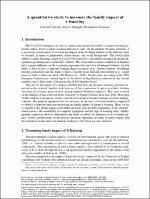Chapter A quantitative study to measure the family impact of e-learning
Author(s)
Davino, Cristina
GHERGHI, Marco
VISTOCCO, Domenico
Language
EnglishAbstract
The Covid emergency has forced universities around the world to transfer teaching activities online. Even if online teaching has made it possible to carry out the planned teaching activities, it is necessary, in retrospect, to evaluate the impact that this teaching method has had on the different types of students, in terms of preparation, characteristics and social background. In this framework, the presents paper aims to evaluate if distance learning can be considered socially less useful because it increases the divide between the advantaged and disadvantaged students. The study is based on the analysis of data collected at the University of Naples Federico II in June 2020. More than 19 thousand students took part in the survey, carried out to monitor distance learning activities. The aim of this work is to analyse whether and how much the distance learning activities has had an impact on the students' families both in terms of the organisation of the spaces and daily rhythms and from an economic point of view, having required additional expenses. This objective will be achieved through the use of a factorial method that will provide a composite indicator measuring the family impact of distance learning. We will then try to explain if the family impact takes different forms and intensity depending on the students' characteristics, the availability of computer equipment and the type of teaching used. Quantile regression will allow to differentiate the study of effects for different levels of family impact. Finally, it will also be evaluated whether the experience lived in terms of the family impact of the distance learning, conditions the judgement on the preferred teaching method for the future, totally online, oriented towards a complete return to face-to-face teaching or a mixed solution that takes advantage of the experience lived.


 Download
Download Web Shop
Web Shop